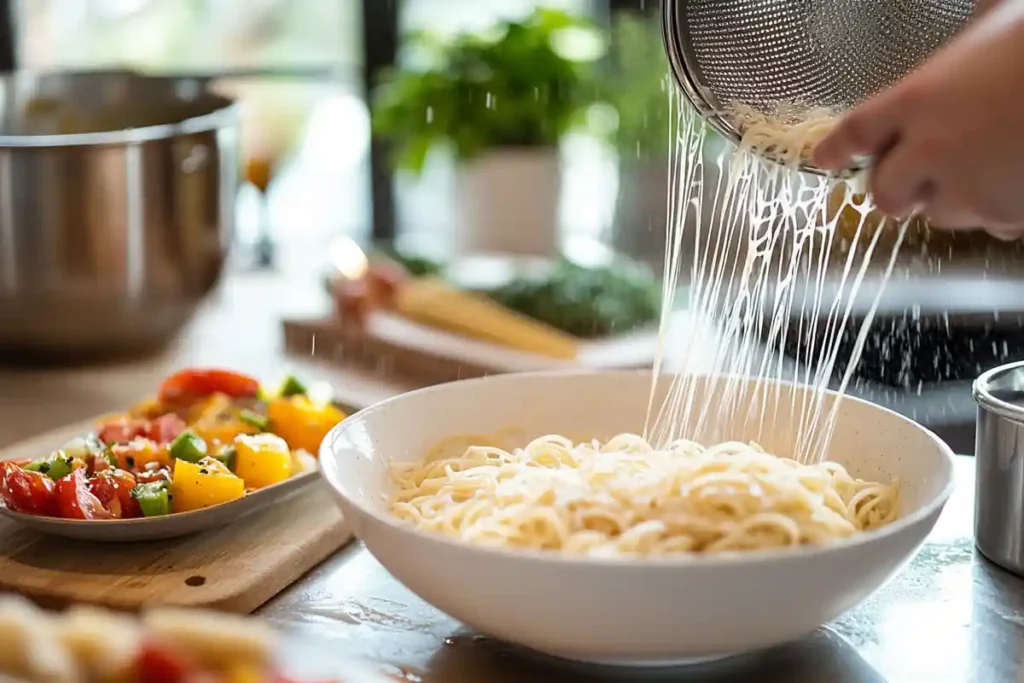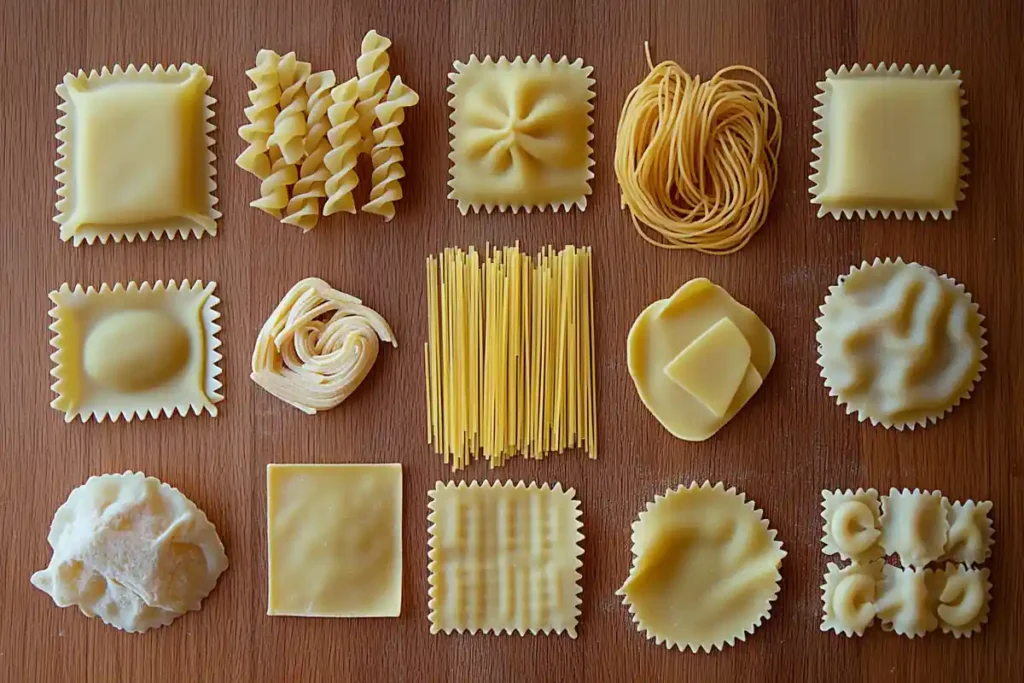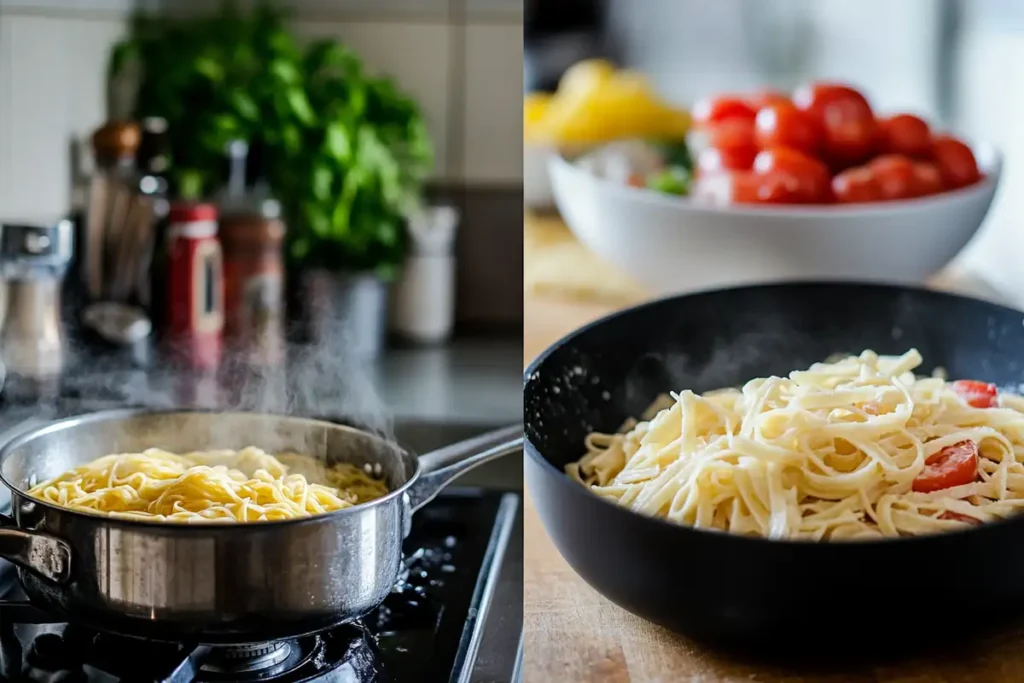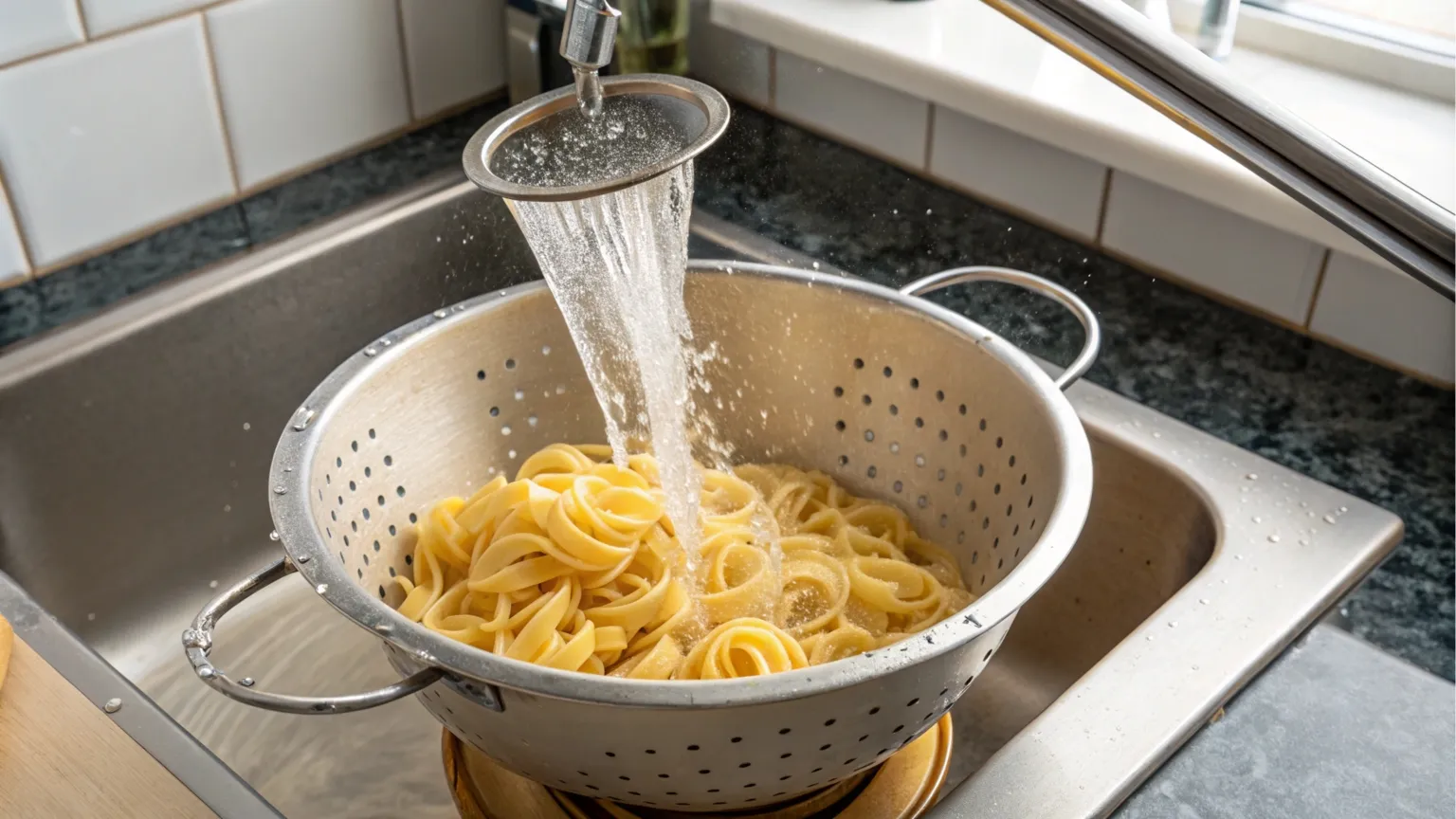Explore whether you should you rinse pasta with cold water after cooking? Learn expert tips, culinary traditions, and best practices for perfect pasta dishes.
Many home cooks often ask: should you rinse pasta with cold water after cooking? Indeed, opinions vary widely. Some people claim it improves texture and removes excess starch. Others argue that rinsing washes away flavor and prevents sauces from clinging. Basically, this topic sparks debate among food enthusiasts. Therefore, understanding when and why to rinse pasta becomes essential. In addition, knowing the correct techniques ensures consistent results. Consequently, you will master pasta dishes that taste delicious every time.
Should you rinse pasta with cold water after cooking? Understanding the Debate
The question should you rinse pasta with cold water after cooking? emerges from differences in cooking traditions. Traditionally, Italians never rinse their pasta. Instead, they rely on residual starch to help sauces cling. Conversely, some American cooks learned to rinse pasta, hoping to reduce stickiness. However, rinsing removes helpful starches. Therefore, the sauce may not adhere as well. Meanwhile, others rinse pasta for cold salads. Indeed, rinsing halts cooking and keeps noodles firm. Consequently, understanding context is key. You must consider whether pasta will be served hot or cold. Undoubtedly, the decision depends on the intended dish.
The Science Behind Starch
When pasta cooks, starches release into the water. These starches coat noodles, making them slightly sticky. However, this stickiness helps sauces bind, resulting in a more flavorful dish. Nevertheless, if you want a chilled pasta salad, excess starch might create a gummy texture. Thus, should you rinse pasta with cold water after cooking? If you plan a cold dish, rinsing ensures a fresher feel. Conversely, for hot dishes, skipping the rinse often yields better sauce adhesion.
Regional Differences and Culinary Habits
Tradition also influences the debate. Italians firmly believe in preserving starch for sauce clinging. Meanwhile, some American culinary schools taught rinsing to prevent clumping. As culinary knowledge spreads, many experts now discourage rinsing for hot pasta dishes. Instead, they recommend stirring and adding a bit of cooking water to maintain consistency. Another factor involves the type of pasta and dish. Therefore, before deciding to rinse, consider cultural context and personal preference.
Best Practices for Texture and Flavor: Should You Rinse Pasta with Cold Water?
In general, avoid rinsing hot pasta destined for a savory sauce. This preserves flavor and texture. Conversely, when preparing a cold pasta salad, a brief rinse stops cooking and cools the noodles. Eventually, you find balance by adjusting technique. Understanding these nuances helps you decide should you rinse pasta with cold water after cooking? based on your recipe’s needs.
When Should you rinse pasta with cold water after cooking? Key Scenarios

So exactly when should you rinse pasta with cold water after cooking? The answer depends on the final dish. If serving a warm, saucy meal, do not rinse. Indeed, the starch helps the sauce adhere. However, for dishes served cold, rinsing is beneficial. Consider these key scenarios:
- Cold Pasta Salads: Rinsing lowers temperature and prevents overcooking.
- Noodle-based Soups: Sometimes, rinsing reduces starchiness if you store noodles separately.
- Pre-Cooked Pasta for Later Use: Rinsing can prevent clumping before storage.
Conversely, if you serve a classic spaghetti with marinara, skip rinsing. Another example: creamy Alfredo demands starch for a silky sauce. Consequently, understanding the dish’s nature guides your choice.
Timing Matters
If you decide to rinse, do it right after draining. Delaying rinsing means pasta continues cooking and may become mushy. By rinsing promptly, you halt cooking instantly. Moreover, use cool or cold water to set the texture. Another tip: after rinsing, toss with a small amount of oil to prevent sticking if you won’t use it immediately. This technique ensures evenly coated, separate strands or shapes.
Sauce Considerations
The sauce’s consistency influences your decision. Heavier cream or cheese-based sauces benefit from starch retention. Thus, do not rinse if you plan such sauces. In contrast, lighter salads or vinaigrettes pair well with rinsed pasta. Therefore, always consider sauce thickness and desired texture before rinsing.
Pasta Shapes and Ingredients

Some pasta types have more surface area or hollow shapes. These trap sauce and flavor. For such pasta, rinsing may strip away beneficial starch and flavor carriers. On the other hand, delicate pasta shapes for salads might benefit from rinsing. Eventually, trial and error guides you. Over time, you will know should you rinse pasta with cold water after cooking? for each specific pasta shape.
If you’re curious about alternatives to ditalini pasta for dishes where rinsing is debated, check out What Is the Closest Pasta to Ditalini?.
Culinary Experts Weigh In: Should you rinse pasta with cold water after cooking?
Professional chefs often advise against rinsing pasta intended for hot dishes. They argue that residual starch is essential. Indeed, many culinary authorities say rinsing reduces flavor integration. Another perspective: some catering or restaurant kitchens rinse pasta after cooking to store it for later use. In that scenario, rinsing prevents clumping during holding. Eventually, they reheat pasta with a bit of sauce or oil. This method works in large-scale settings but differs from home cooking needs.
Balancing Tradition and Practicality
Tradition emphasizes not rinsing. However, modern kitchens recognize practical exceptions. For instance, if making a big batch of pasta for a potluck salad, rinsing ensures firm texture. Ultimately, chefs suggest understanding your dish’s requirements. While tradition provides a baseline, practical considerations matter. Consequently, there is no absolute rule. Instead, think logically about final results.
Achieving Consistency and Quality
Professional cooks aim for consistent results. Thus, they ask themselves should you rinse pasta with cold water after cooking? only when necessary. Consistency comes from uniform methods. If you rinse noodles for a dish once and skip next time, results differ. Therefore, maintain a standard approach for each recipe. With practice, you’ll identify which dishes need rinsing and which do not.
Learning from Experience
Cooks learn best by testing methods. Try preparing the same pasta dish twice. In one version, rinse after cooking. In the other, skip rinsing. Compare flavor, texture, and sauce adhesion. This hands-on approach builds confidence. Eventually, you will determine your own guidelines and answer the question should you rinse pasta with cold water after cooking? based on evidence.
Should you rinse pasta with cold water after cooking? Best Practices for Pasta Salads
For cold pasta salads, should you rinse pasta with cold water after cooking? The short answer: yes. Rinsing stops cooking, ensures firm texture, and removes excess starch that could cause clumping. Additionally, rinsing cools the pasta quickly, allowing you to add fresh vegetables, dressings, and other ingredients without worrying about wilting or overcooking.
- Tip: After rinsing, drain thoroughly.
- Tip: Toss with a bit of oil to keep pasta separate.
These steps yield bright, refreshing salads. Eventually, you’ll appreciate how rinsing improves the overall balance of flavors and textures in cold preparations.
Should you rinse pasta with cold water after cooking? A Look at Different Pasta Types
Consider various pasta shapes. For spaghetti or linguine in hot dishes, do not rinse. For pasta used in soups or brothy dishes, sometimes a brief rinse helps if you plan to store noodles separately. For specialty shapes like farfalle or fusilli in a salad, rinsing ensures each piece remains distinct. Thus, should you rinse pasta with cold water after cooking? depends on your chosen shape and final recipe.
- Long Noodles (Spaghetti, Linguine): Avoid rinsing for hot dishes.
- Short Shapes (Penne, Fusilli): Rinse if using in salads, skip if serving hot.
- Starchier Shapes (Ditalini, Orzo): Rinse for salads or cold soups to prevent gumminess.
- Filled Pasta (Ravioli, Tortellini): Generally skip rinsing unless making a cold dish.
By recognizing each shape’s characteristics, you will know exactly when to rinse.
For an in-depth look at pasta’s versatility, read Why Use Ditalini Pasta? A Comprehensive Guide.
Should you rinse pasta with cold water after cooking? The Final Verdict
Ultimately, should you rinse pasta with cold water after cooking? boils down to context. For hot, saucy dishes, avoid rinsing. For cold salads or recipes where starchiness hinders freshness, rinse away. By using these guidelines, you maintain control over texture and flavor.
In short:
- For hot dishes: No rinse.
- For cold dishes: Rinse for best results.
- For storing cooked pasta: Rinse if needed to prevent clumping, then reheat with sauce.
This flexibility ensures every meal meets your expectations.
Factors Influencing the Decision: Should you rinse pasta with cold water after cooking?
Several factors shape your choice. First, consider the dish’s temperature. Hot dishes rely on starch. Cold dishes need fresh textures. Second, think about your sauce. Thick sauces benefit from more starch, while lighter dressings may require rinsing. Third, note how quickly you plan to serve. If holding pasta for later use, rinsing helps maintain quality. Another consideration: personal taste. Some people prefer less starchy pasta even in hot dishes. Adjust according to your palate.
Personal Preference and Experimentation
Cooking is personal. What works for one cook may not suit another. Therefore, should you rinse pasta with cold water after cooking? depends on your preference. Experiment with different methods. Eventually, settle on techniques that consistently deliver desired results. Over time, you’ll fine-tune your approach based on feedback from friends, family, and your own taste buds.
Health and Nutrition Considerations
From a nutritional standpoint, rinsing does not significantly alter pasta’s nutritional profile. The main effect involves texture and flavor. However, if rinsing encourages you to eat more vegetables or lean proteins in a pasta salad, that’s a bonus. In essence, health factors rarely dictate rinsing decisions. Focus on texture and taste instead.
Saving Time and Effort
Some cooks might skip rinsing due to convenience. Rinsing adds a step. If you value simplicity and typically serve hot pasta, skipping rinsing saves time. Conversely, if preparing salads or making large batches for later, a quick rinse can prevent hassles down the line. Consider your kitchen workflow when deciding your approach.
Want to try a new take on pasta dishes? Explore What Pasta Is Like Lasagna but Thinner? for creative options that pair well with specific sauces.
Cultural Perspectives: Should you rinse pasta with cold water after cooking?

In Italy, the birthplace of pasta, chefs generally say no. They believe pasta’s starch is integral to authentic dishes. In America, some older cookbooks suggested rinsing. However, modern culinary education leans toward not rinsing hot pasta. Cultural perspectives shape habits, but globalization of cuisine encourages flexibility. Today, many home cooks blend traditions. They might skip rinsing for spaghetti marinara but rinse for a summer pasta salad with feta and olives.
Embracing Culinary Diversity
As international influences shape our recipes, the answer to should you rinse pasta with cold water after cooking? evolves. One may discover a Japanese-inspired cold soba salad benefits from rinsing. Likewise, a Mediterranean pasta dish might be more flavorful without rinsing. Embrace diversity. Different cuisines inspire new practices. Rather than rigid rules, consider guidelines that adapt to various flavors and cooking styles.
Respecting Tradition, Exploring New Methods
While respecting Italian traditions, don’t fear trying new methods. Culinary creativity thrives on experimentation. If rinsing improves a specific dish’s texture, go for it. No universal mandate exists. Cooking remains an art guided by principles, but ultimately shaped by personal preference.
Practical Tips for Optimal Results
To achieve the best outcome, follow these tips:
- Taste Test: After cooking pasta, taste a strand before deciding to rinse.
- Check Sauce Consistency: If sauce is thick, skip rinsing. If it’s a light dressing, rinse.
- Keep a Timer: Overcooking leads to mushiness, which rinsing cannot fix.
- Reserve Pasta Water: Even if you rinse for salads, consider saving some starchy water for adjusting dressings.
These strategies help you refine your decision-making. With time, the question should you rinse pasta with cold water after cooking? will feel less confusing.
Communication with Guests or Family
If cooking for others, explain your choices. For example, if serving a pasta salad, mention that you rinsed to achieve a fresh texture. Transparency fosters appreciation. When diners understand why you chose a particular method, they value the final result more.
Adapting to Special Occasions
For a formal dinner party, you might opt not to rinse, showcasing authentic Italian techniques. Conversely, for a casual backyard barbecue, rinsing the pasta salad ensures crisp, refreshing bites. Adapt your approach based on the event, dish, and crowd.
Looking for additional kitchen advice? Learn about protein preparation and kitchen hygiene in Do You Wash Diced Chicken Before Cooking?.
Embracing Consistency and Confidence in Cooking
After exploring all angles, you’ll answer should you rinse pasta with cold water after cooking? with confidence. Consistency emerges from understanding how each method affects texture, flavor, and overall quality. As you gain experience, you develop intuition. That intuition guides you to make quick, informed decisions. Eventually, you will no longer hesitate or second-guess. Instead, you’ll craft pasta dishes that perfectly match your vision, whether hot and comforting or cool and bright.
Frequently Asked Questions (FAQs)
Do you rinse pasta in cold water after cooking?
Not always. Rinse pasta in cold water if making a pasta salad or stopping the cooking process. Otherwise, if serving hot pasta dishes with sauce, do not rinse. The starch helps the sauce cling to the noodles.
Do Italians rinse their pasta in cold water?
Generally, Italians do not rinse pasta in cold water after cooking. They consider the starch integral to flavor and sauce adherence. Instead, they rely on proper cooking times and sauce techniques to achieve the right texture and consistency.
Can you leave pasta in cold water after cooking?
You can, especially if you plan to use it later. Rinsing and then leaving pasta in cold water prevents sticking and keeps it firm. However, do not leave it submerged for too long. Instead, drain it well and toss with a small amount of oil to prevent clumping.
How do restaurants keep pasta from sticking?
Restaurants often cook pasta in large batches, then rinse it if they plan to hold it before serving. They may add a small amount of oil to prevent sticking. Before plating, they reheat pasta in hot water or sauce. This method ensures quick service while maintaining good texture. However, for freshly served pasta, most chefs skip rinsing and focus on timing, sauce consistency, and occasional stirring to prevent sticking.
Looking for more? Check out our other links for even greater insights and inspiration!

